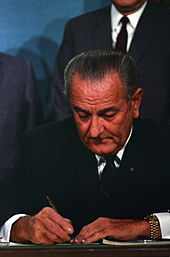It was 45 years ago today
Lyndon Baines Johnson signed the Public Broadcasting Act into law on November 7, 1967. Why? And what impact has it had on our lives as Americans?
The “why” is fairly straightforward. Like national parks and the Smithsonian, the broadcast spectrum is a publicly “owned” natural resource. This is why a broadcast license must be issued by the Federal Communications Commission to all entities using that spectrum. By the mid-’60s it became clear that the public interest in this resource needed to be protected. The Act took two steps: it set aside a portion of the spectrum for non-commercial and/or educational purposes; and, it provided funding for the production of educational and cultural programs through the establishment of the Corporation for Public Broadcasting.
The creation of the CPB was visionary. Here’s an excerpt from the remarks President Johnson made as he signed the Act into law:
“…I think we must consider new ways to build a great network for knowledge–not just a broadcast system, but one that employs every means of sending and storing information that the individual can use…Think of the lives that this would change:–the student in a small college could tap the resources of a great university.”
Prophetic, I would say, and in spite of all the technological advances since 1967, the intent of the Act is still relevant. I believe we can all take pride in the public media resource we’ve built together over the past 45 years, keeping in mind that the bulk of the CPB funding goes directly to individual radio and tv stations, like NCPR, to produce and acquire programs that serve the needs of their communities.
Here’s more about public media and the CPB.
Okay, I couldn’t resist. Like so many others, I have a kid who grew up learning the alphabet, the rudiments of reading and math, and a lot about diverse and interesting people around us from this guy and his friends:
Tags: Big Bird, fcc, LBJ, public broadcasting act, public media, public radio, public tv










The purpose of public broadcasting is to air views that are not sufficiently lowest-common-denominator for commercial broadcasters to bother way. It’s too bad that NPR and PBS News give tons of coverage to the same mainstream political views as the commercial media and largely ignores those outside the box views that the rest of the media ignores but that public broadcasting was supposedly invented to give voice to.